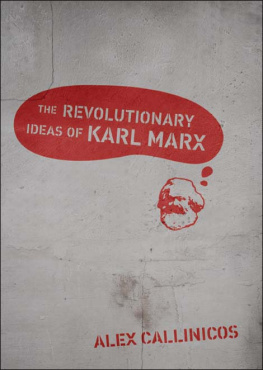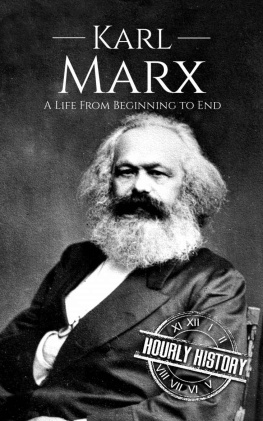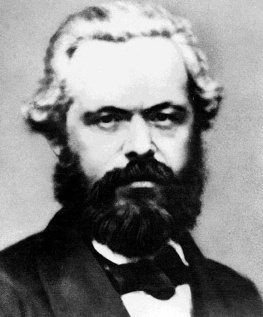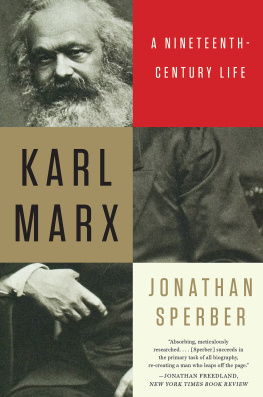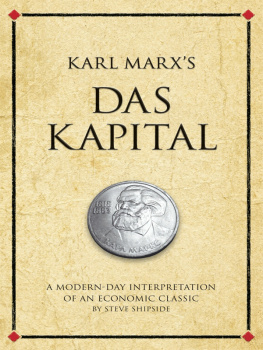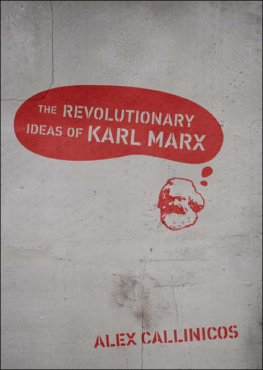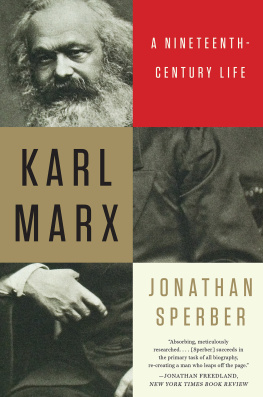Callinicos - The Revolutionary Ideas of Karl Marx
Here you can read online Callinicos - The Revolutionary Ideas of Karl Marx full text of the book (entire story) in english for free. Download pdf and epub, get meaning, cover and reviews about this ebook. publisher: Haymarket Books, genre: Science. Description of the work, (preface) as well as reviews are available. Best literature library LitArk.com created for fans of good reading and offers a wide selection of genres:
Romance novel
Science fiction
Adventure
Detective
Science
History
Home and family
Prose
Art
Politics
Computer
Non-fiction
Religion
Business
Children
Humor
Choose a favorite category and find really read worthwhile books. Enjoy immersion in the world of imagination, feel the emotions of the characters or learn something new for yourself, make an fascinating discovery.
- Book:The Revolutionary Ideas of Karl Marx
- Author:
- Publisher:Haymarket Books
- Genre:
- Rating:4 / 5
- Favourites:Add to favourites
- Your mark:
- 80
- 1
- 2
- 3
- 4
- 5
The Revolutionary Ideas of Karl Marx: summary, description and annotation
We offer to read an annotation, description, summary or preface (depends on what the author of the book "The Revolutionary Ideas of Karl Marx" wrote himself). If you haven't found the necessary information about the book — write in the comments, we will try to find it.
The Revolutionary Ideas of Karl Marx — read online for free the complete book (whole text) full work
Below is the text of the book, divided by pages. System saving the place of the last page read, allows you to conveniently read the book "The Revolutionary Ideas of Karl Marx" online for free, without having to search again every time where you left off. Put a bookmark, and you can go to the page where you finished reading at any time.
Font size:
Interval:
Bookmark:
The Revolutionary Ideas
of Karl Marx
THE REVOLUTIONARY
IDEAS OF KARL MARX
Alex Callinicos

Haymarket Books
Chicago, Illinois
First published 1983.
Bookmarks Publications Ltd,
c/o 1 Bloomsbury Street,
London WC1B 3QE
This edition published in 2011 by
Haymarket Books
PO Box 180165
Chicago, Illinois 60618
773-583-7884
www.haymarketbooks.org
ISBN: 978-1-60846-138-7
Cover design by Josh On.
Trade distribution:
In the US, Consortium Book Sales and Distribution, www.cbsd.com
In Canada, Publishers Group Canada, www.pgcbooks.ca
Published with the generous support of Lannan Foundation and the Wallace Global Fund.
10 9 8 7 6 5 4 3 2 1
Alex Callinicos is a leading member of the Socialist Workers Party. He is a professor of European Studies at Kings College London and is the author of, among other books, Making History (1987), Against Postmodernism (1989), An Anti-Capitalist Manifesto (2003), Imperialism and Global Political Economy (2009) and Bonfire of Illusions (2010).
My aim in this book has been to fill a gap in the literature on Marx by providing an accessible modern introduction to his life and thought by someone who shares his basic beliefs on history, society and revolution. I am grateful to a number of people for their help and encouragement: to Peter Clark and Tony Cliff, who had the idea in the first place; to Tony Cliff for his searching criticisms of the book in manuscript; and to Peter Goodwin and Peter Marsden, who performed the same task as well as the more difficult one of trying to make the book readable. Although the general political standpoint taken in this book is that of the Socialist Workers Party, the errors it undoubtedly contains are all my own. I would like to dedicate The Revolutionary Ideas of Karl Marx to Joanna Seddon, to whom I owe, among other things, such knowledge as I have of the Utopian socialists.
Only references to the writings of Marx and Engels have been included. The following abbreviations have been used:
| AD | Engels, Anti-Dhring (Moscow, 1969) |
| C | Marx, Capital: Volume i (Harmondsworth, 1976), Volume ii (Moscow, 1956), Volume iii (Moscow, 1971) |
| CW | Marx and Engels, Collected Works, 50 vols published or in preparation (London, 1975-) |
| CWF | Marx, The Civil War in France (Peking, 1966) |
| G | Marx, Grundrisse (Harmondsworth, 1973) |
| SC | Marx and Engels, Selected Correspondence (Moscow, 1965) |
| SW | Marx and Engels, Selected Works, 3 vols (Moscow, 1973) |
| TSV | Marx, Theories of Surplus Value, 3 vols (Moscow, 1963-72) |
| V | Value: Studies by Marx (London, 1976) |
Marxs great theme was capitalismhow to understand it, the better to overthrow it. The most famous text he and his friend and comrade Friedrich Engels wrote, The Communist Manifesto, appeared as Europe was being swept by revolutions in 1848a historical moment somewhat similar to the great revolutionary surge across the Arab world in 2011. It is an astonishingly prophetic work. At the time, industrial capitalism was firmly established only in Britain (above all in Engelss Manchester), in Belgium, and on the northeaster coast of the United States. But Marx understood that this new economic system would conquer the world and subject it to the remorseless logic of competitive accumulation.
However he also understood that it was a system that was deeply and fundamentally flawed. At its heart lay the antagonism between capital and wage labor. As Marx showed systematically in the great cycle of economic studies culminating in his unfinished masterpiece Capital, the profits sought by capitalists comes from exploiting the workers they employ. Capitalism is therefore riven with conflict, which is not some kind of accident or mistake but derives from its innermost nature. But the class struggle between capitalists and workers is exacerbated by the systems liability to regular and destructive economic crises. Marx was one of the first to recognize that capitalism goes through a regular cycle of booms and slumps and one of his main preoccupations in his economic writings was to explain why this happens. In Capital he shows how the competitive struggles among rival firms lead them to increase investment more quickly than profits, causing a fall in the rate of profit that pushes the economy into crisis. He also spends a lot of time analyzing the role of the credit systemwhat we would now call financial marketsin making capitalism function, in the short term postponing crises, in the longer term making them worse.
This brief summary should make it perfectly clear why Marx is still worth reading. For the past twenty years we have lived in the era of what is endlessly trumpeted as globalization. This is not simply the greater economic integration of the world but also the global triumph of neoliberal capitalismin other words, capitalism unrestrained, the rule of the free market. In the Manifesto, referring to the Opium War through which Britain broke open Chinas markets, Marx writes: The cheap prices of commodities are the heavy artillery with which it batters down all Chinese walls. Today, China is the new workshop of the world, producing a fifth of global manufacturing output, and helping to drive further economic integration. In the late 1990s, the Wall Street Journal summed up this triumphalist mood with the slogan Adventures in Capitalism. But it has turned out to be a bumpy ride, as a succession of increasingly serious economic crises have borne witnessthe East Asian crisis of 199798, the collapse of the dot-com boom in 200001, and, of course, the financial crash of 2008, which helped to precipitate the most severe global economic slump since the 1930s.
After each of these economic shocks there was a wave of articles in the mainstream media announcing the rediscovery of Marx. But there have been other, arguably more important signs that Marxs enduring importance is recognized, notably the extraordinary success of David Harveys online lectures on Marxs Capital. So it seems like a good time to republish my own introduction to Marx. The Revolutionary Ideas of Karl Marx first appeared a long time ago, in 1983, in a very different political environment, as the introduction to the 1995 edition explains. But, despite the passage of time, I believe the text stands up as an exposition of Marxs thought. I have left the text unaltered with the exception of minor stylistic changes and updates, and corrections. I would write the book differently now (the omission of any discussion of Marxs analysis of the credit system seems like a particular weakness in the light of recent events), but it has acquired a degree of independence from me, like a child that has matured into adulthood and can stand on its own feet.
One of the main themes of the book is the unity of Marxs life and thought as critical theorist and revolutionary activist. As I said at the start of this introduction, he sought to understand capitalism the better to overthrow it. He believed the experience of the internal contradictions of capitalism would encourage workers to form themselves into a collective political subject and smash the existing system, replacing it eventually with a classless communist society. The collapse of the Stalinist regimes in Central and Eastern Europe and the Soviet Union at the end of the 1980s, coming as it did after a series of defeats for the Western workers movement, dealt a serious blow to the left internationallydespite the fact that, as I show at length, Marxs own conception of socialism as the self-emancipation of the working class is the antithesis of the concentration of power at the top that was a defining feature of these regimes. But we have seen since the late 1990s a slow process of recovery of the genuine anticapitalist left, at the same time as the Third Waythe attempt to revive social democracy by marrying it to neoliberalismhas come and gone, discredited above all by Tony Blairs role in Britain as a champion of imperialist wars.
Next pageFont size:
Interval:
Bookmark:
Similar books «The Revolutionary Ideas of Karl Marx»
Look at similar books to The Revolutionary Ideas of Karl Marx. We have selected literature similar in name and meaning in the hope of providing readers with more options to find new, interesting, not yet read works.
Discussion, reviews of the book The Revolutionary Ideas of Karl Marx and just readers' own opinions. Leave your comments, write what you think about the work, its meaning or the main characters. Specify what exactly you liked and what you didn't like, and why you think so.

